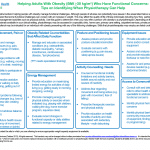As summer turns to fall and then to winter, so, too, does the typical sports fan’s attention turn from the baseball diamond to the football field.
It’s not a bad idea for wellness business owners to take a look at football, too—but for reasons that have little to do with their favorite team and everything to do with their own business.
Coaches plan for both expected and unexpected scenarios. They know what to do in common game situations, and they plan for crises like having their star quarterback out for the season with a torn rotator cuff.
Businesspeople should prepare the way football coaches do, but most players in the “wellness league” don’t.
Here’s how you can avoid making a desperate Hail Mary pass and instead coach your business to a higher level of play:
1. Write your playbook. Like coaches who create a playbook describing plays for every likely game situation, wellness business owners need a policy manual detailing every procedure used every day, particularly those dealing with customers, revenue, and safety. They should also cover expectations around terminations, vacations, and other key events.
Don’t rely on staff sharing information informally about how things get done. Standardize your policies, and then communicate them consistently throughout your business.
If you’re the manager of a health club, for example, how does your staff greet visitors? Does everyone know how to provide a well-rehearsed tour of your facility? What routines are in place to follow up with prospects? What should staff do if a client gets injured in the club?
How do you handle bad weather and related changes in business hours? Do clients just have to guess whether you’re open?
2. Make practice mandatory. Playbooks are essential, but coaches know that sound preparation via regular practices is key to learning new plays because retention goes up dramatically when learners actually engage in a novel task.
Smart businesses follow the same principle with ongoing training. Chiropractors, for instance, might gather their CAs to demonstrate a new adjustment technique.
3. Play Monday morning quarterback. Coaches and their teams review videos of their last game to dissect every play, every situation. Always striving for a win, they continually adjust plays as the season and opponent require.
You can do the same thing by asking, “What do we do really well, and where do we need improvement?”. Maybe you’re a personal trainer with a knack for bonding with clients and thus strong customer loyalty. But what can you do to attract more new clients? Don’t forget to analyze the “opposing team,” too—the competition. Maybe you can walk into a competitor’s gym and see firsthand what they’re doing to bring in new clients. What best practices exist that you can transfer to your business?
4. Have a back-up playing field. In the wake of Hurricane Katrina’s damage to their Superdome, the New Orleans Saints split their 2005 season between stadiums in San Antonio and Baton Rouge.
If a similar natural catastrophe struck your area, would your business survive?
Identify alternative locations and ways of doing business before you need them. If a key supplier’s farm hits a drought, how will you supply your co-op’s organic produce section?
What will you do if your city experiences a blackout that makes taking phone calls, logging onto computers—in short, doing business—impossible? Protecting your data is critical.
5. Keep your second team at the ready. When a starting player gets sidelined, coaches call on a reserve who knows and has practiced the plays.
Business owners should prepare for a similarly seamless transition if one of their key employees is out. If your massage therapist takes maternity leave for three months, who will cover for her? If your office manager moves cross-country, does someone else know how to create invoices and take inventory?
Great teams don’t just happen. Neither do great businesses. Take a page from a football coach’s playbook to score an All-Pro business.



